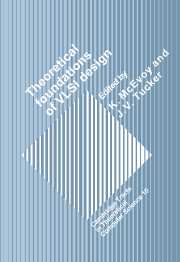Theoretical Foundations of VLSI Design
This book discusses recent research in the theoretical foundations of several subjects of importance for the design of hardware, and for computer science in general. The physical technologies of very large scale integration (VLSI) are having major effects on the electronic industry. The potential diversity and complexity of digital systems have begun a revolution in the technologies of digital design, involving the application of concepts and methods to do with algorithms and programming. In return, the problems of VLSI design have led to new subjects becoming of importance in computer science. Topics covered in this volume include: models of VLSI complexity; complexity theory; systolic algorithm design; specification theory; verification theory; design by stepwise refinement and transformations. A thorough literature survey with an exhaustive bibliography is also included. The book has grown from a workshop held at the Centre for Theoretical Computer Science at Leeds University and organised by the editors.
Product details
February 2011Adobe eBook Reader
9780511875663
0 pages
0kg
This ISBN is for an eBook version which is distributed on our behalf by a third party.
Table of Contents
- Introduction
- Part I. Formal Methods and Verification:
- 1. A mechanised proof of correctness of a simple counter
- 2. A formal model for the hierarchical design of synchronous and systolic algorithms
- 3. Correctness proofs for systolic algorithms
- 4. A palindrome recogniser
- Part II. Theory and Methodology of Design:
- 5. Formal specification of a digital correlator
- 6. Describing and reasoning about circuits using relations
- Part III. Models of Circuits and Complexity Theory:
- 7. Superpolynomial bounds on monotone network complexity
- 8. The prioritiser experiment
- 9. Estimation and measurement of computation time in VLSI.


